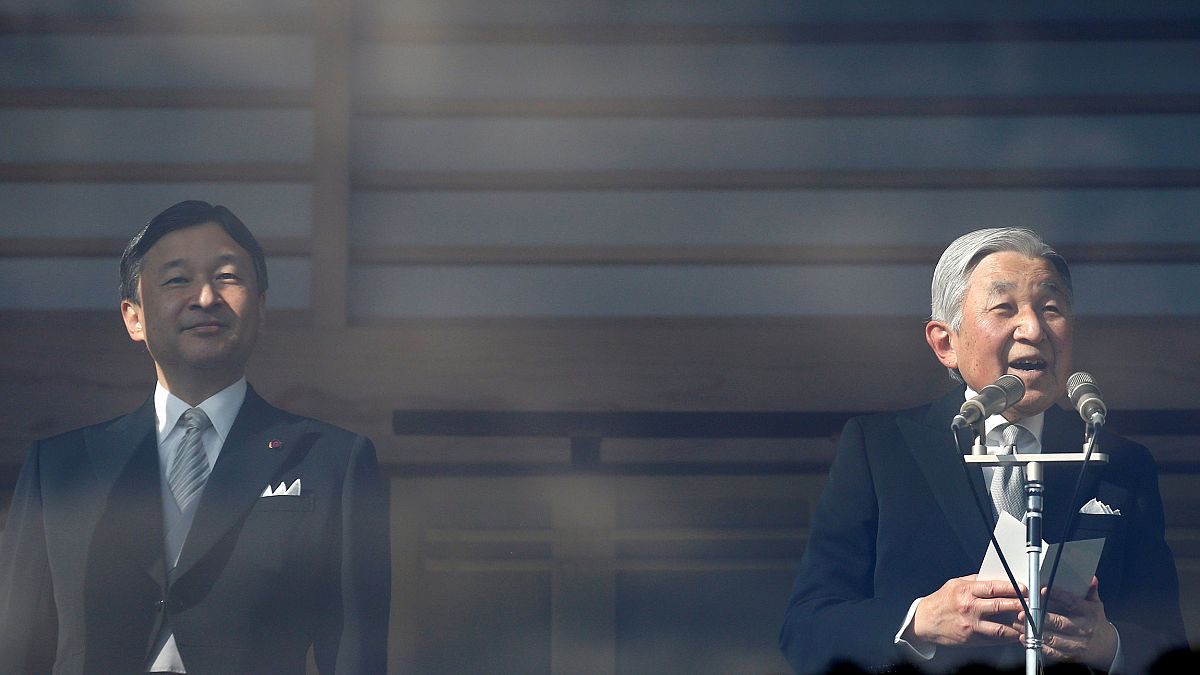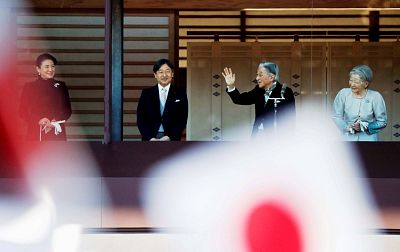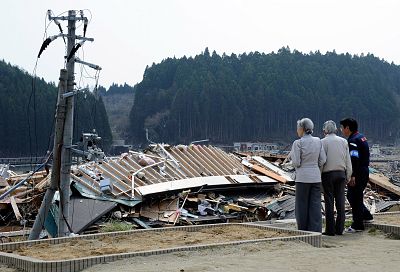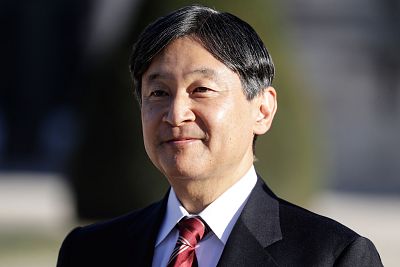Akihito, 85, will step down Tuesday after more than 30 years on the Chrysanthemum Throne.
TOKYO — When Emperor Akihito abdicates Tuesday, he will become the first Japanese monarch to do so in more than two centuries.
Akihito, 85, will step down after more than 30 years on the Chrysanthemum Throne.
His reign has seen Japan continue its post-war modernization and win a bid to host the Olympic Games in Tokyo in 2020, but has also been marked by lows such as the economic crash of the 1990s and severe natural disasters.
He is widely revered for bringing the imperial family closer to the people, and has also won respect for his efforts to heal the nation's post-World War II wounds. In a sign of Akihito's popularity, a record crowd packed into the grounds around the Imperial Palace in early January for his final New Year's public appearance.
This imposing legacy, combined with shifts in the nation's politics and rising regional tensions, leave Akihito's eldest son, Crown Prince Naruhito, facing numerous challenges after he assumes the symbolic role May 1, experts say.
'A revolutionary emperor'
The last Japanese emperor to abdicate was Emperor Kokaku in 1817. Since then, emperors have ruled until their deaths.
Three years ago, however, Akihito addressed the nation and signaled his desire to retire due to his advanced age and health concerns, a step that required the passage of special legislation through the national Parliament.
"I would say that he is a revolutionary emperor compared to all of the emperors in the past," said Makoto Inoue, a Japanese journalist who has written books about the imperial system.
While Japanese monarchs were once regarded as having divine, God-like status, the U.S.-backed constitution introduced after World War II reduced the position to "the symbol of the State and of the unity of the People." The head of government is the prime minister, a position held by Shinzo Abe.
"Under the constitution, the Japanese emperor is the symbol, but I think I can say that this emperor has transformed the symbol into a human being," Inoue said.
Akihito had "a strong determination that he was not going to be an emperor like a robot" but would instead bring the position closer to the people, he added.
One of the ways he achieved this was by consoling the victims of Japan's natural disasters, including the 2011 earthquake and tsunami that triggered the Fukushima nuclear plant meltdowns. Akihito and his wife, Empress Michiko — who was a commoner before their marriage in 1959 — visited disaster shelters to support grief-stricken residents. In their travels, they also offered encouragement to the elderly and people with disabilities.
That the emperor would "go and visit them, hold their hands, see eye to eye physically and literally, that the emperor would have a kind of human to human contact, this was a major surprise to the Japanese people," Inoue said.
Arguably, however, Akihito's most significant steps were his efforts to heal the nation's wartime scars.
Akihito's father, Hirohito, reigned for 62 years, leading Japan through a period of imperial expansionism and World War II. The level of Hirohito's responsibility for the war is a matter of ongoing historical dispute.
Inoue said that up until Hirohito's death in 1989, "it was a taboo for the emperor to squarely deal with the war."
In contrast, Akihito and Michiko have traveled abroad and expressed "the deepest regret" about the "great suffering" inflicted on the people of the region, including those in China and the Korean Peninsula. They also reached out to Japan's island prefecture of Okinawa, the scene of one of the most brutal battles during World War II, where U.S. troops are still based. In February, marking the 30th anniversary of his accession to the throne, Akihito noted approvingly that during his reign, "Japan has been free of war for the first time in modern history, supported by the strong desire of the people for peace."
Jeff Kingston, director of Asian studies at Temple University Japan, said Akihito has reinvented the role of the emperor and soothed the suffering of people scarred by war and natural disasters.
"Despite constitutional constraints forbidding him to play a political role, he has influenced the politics of the past in profound ways by making gestures of contrition and remarks of remorse that convey his abhorrence about Japan's Asian rampage," Kingston said.
"Akihito ascended to the throne at a time when the mainstream consensus was that Japan should do more to promote reconciliation with neighboring nations victimized by Japan's imperial aggression."
'Beautiful Harmony'
Some observers believe it will be a hard act to follow for Naruhito, 59.
The Oxford-educated heir is expected to greet the public alongside his wife, Masako, 55, at the Imperial Palace in central Tokyo three days later.
The Japanese government has announced that President Donald Trump and first lady Melania Trump will be the first state guests of the new emperor and empress when the pair visit Japan from May 25-28.
Without close friends in East Asia, Japan continues to see the United States as a crucial ally. Abe has also met with Trump and has managed to largely stay on good terms with the president, despite some friction over trade.
Relations between Japan and two of its closest neighbors, South Korea and China, remain strained over their war history and territorial disputes. While Japan and China have worked to improve their relationship in recent times, Tokyo remains wary of Beijing's rising power.
Naruhito said last year that he believed it was important to deepen mutual understanding with other countries, so he hoped to play a role in international goodwill and cultural exchange efforts.
He has also expressed a particular interest in environmental issues, including the need to improve access to clean water sources and build resilience to drought and flooding disasters.
Kingston said Naruhito showed signs "that he is ready to grasp the baton and carry forward his father's work in addressing the unfinished business of war and in serving as the nation's consoler in chief."
But changes within Japanese society could pose a challenge.
"Problematically, this message doesn't resonate as powerfully now as the wartime generation is fading and the younger generations aren't so keen to assume the burdens of the past, while the political elite suffers from perpetrator's fatigue," Kingston said.
Kingston argued that the political center in Japan had shifted right, with a trend toward revisionist denials of history and opposition to so-called "apology diplomacy."
According to Japan's traditional calendar system, Akihito's reign is known as the Heisei (achieving peace) era. When Naruhito ascends the Chrysanthemum Throne, it will mark the beginning of an era called Reiwa (beautiful harmony).
But with an aging and shrinking population, continued regional tensions and challenges to its social cohesion, Japan's new emperor may find it harder to make good on that sentiment.



